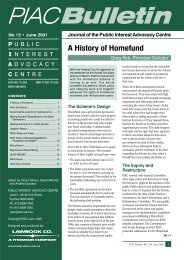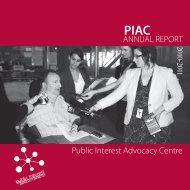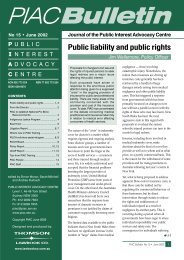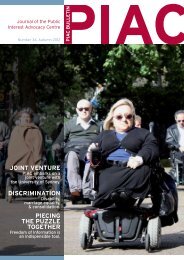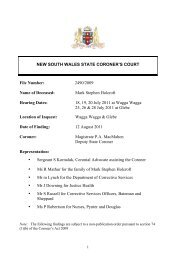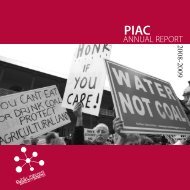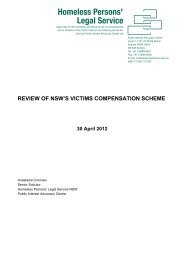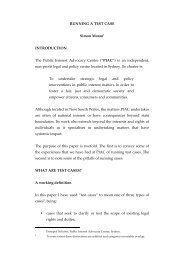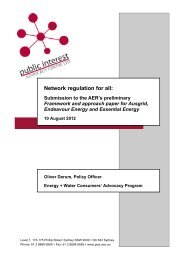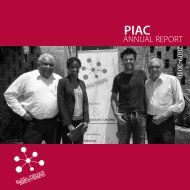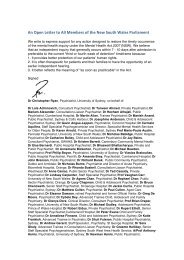PIACBulletin16 - Public Interest Advocacy Centre
PIACBulletin16 - Public Interest Advocacy Centre
PIACBulletin16 - Public Interest Advocacy Centre
Create successful ePaper yourself
Turn your PDF publications into a flip-book with our unique Google optimized e-Paper software.
An invitation<br />
From the Director<br />
To celebrate 21 years of rocking the boat, PIAC and PILCH would be delighted if you<br />
would join Roy Slaven and HG Nelson to party in the public interest on<br />
Friday, 28 th February, 2003<br />
At the Tattersalls on Elizabeth Street, Sydney<br />
From 630pm<br />
There will be jazz and champagne, fine fare and fundraising<br />
Tickets: $220-00 (inclu gst) or $110-00 (concession)<br />
Seating is limited so it is advisable to book soon<br />
Call Fabiola Rofael on (02) 9299 7833 to make a reservation or email frofael@piacasnau<br />
Tables of 10 will be available<br />
I look forward to seeing you in February<br />
Reparations tribunal supported<br />
Amanda Cornwall, Senior Policy Officer<br />
PIAC has called for state and federal<br />
governments to review their programs for<br />
the stolen generations and to establish<br />
reparations tribunals for the stolen<br />
generations The call was made at the<br />
launch in September of restoring identity,<br />
the final report of the Moving forward<br />
consultation The call was echoed by<br />
project partners, the Aboriginal and Torres<br />
Strait Islander Commission, the National<br />
Sorry Day Committee, the Human Rights<br />
and Equal Opportunity Commission and<br />
Northern Territory stolen generations<br />
groups The South Australian, Western<br />
Australian, Victorian and Queensland<br />
governments made public statements<br />
about what they are doing to implement<br />
the report<br />
Restoring identity reveals that many<br />
government and church programs since<br />
the publication of HREOC’s Bringing them<br />
home report, have failed the stolen<br />
generations It reflects the views of<br />
Indigenous people who were consulted<br />
during the project and calls for the<br />
adoption of a number of<br />
recommendations:<br />
• programs to ensure effective access to<br />
government and church held personal<br />
and family records for Indigenous<br />
peoples;<br />
• counselling services that target members<br />
of the stolen generations effectively and<br />
meet their needs, especially at times of<br />
family tracing and reunion;<br />
• an appropriate forum, or tribunal, for<br />
Indigenous peoples to tell of their<br />
experience of forcible removal and have<br />
it officially acknowledged;<br />
• recognition by governments of the<br />
distinct identity of the stolen generations<br />
and consultations to ensure that<br />
programs meet their needs; and<br />
• compensation for the harm caused by<br />
forcible removal policies, especially<br />
where crimes were committed against<br />
people in state care<br />
The measures recommended offer an<br />
important model for all governments keen<br />
to demonstrate a commitment to the<br />
needs of the stolen generations They are<br />
modest and can be achieved with minimal<br />
financial cost<br />
In our discussions with some state<br />
governments, PIAC has been<br />
encouraged to discover that some of the<br />
recommendations have been<br />
implemented The Victorian<br />
Government has established a Stolen<br />
* p 4<br />
2 PIAC Bulletin No 16 • December 2002




